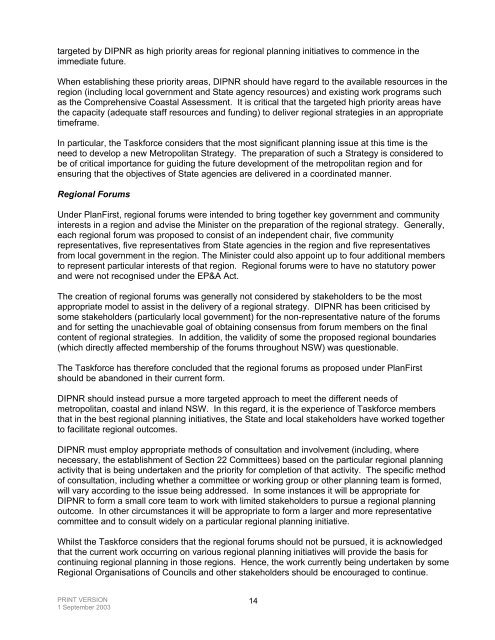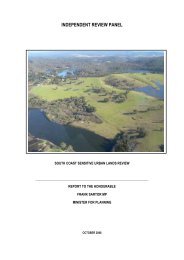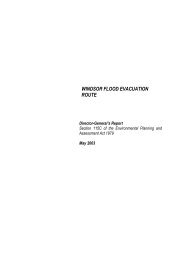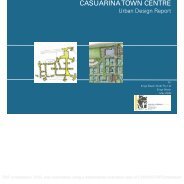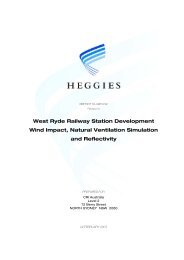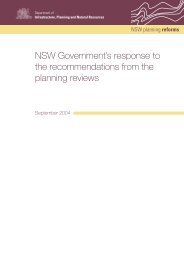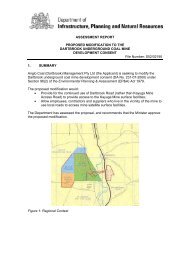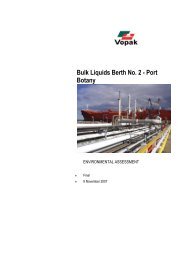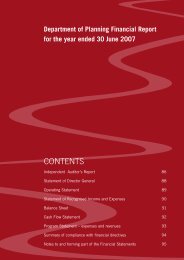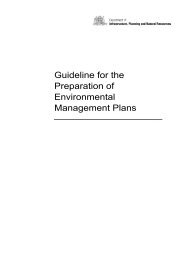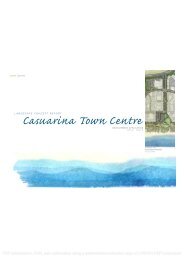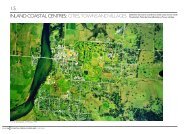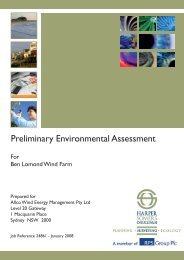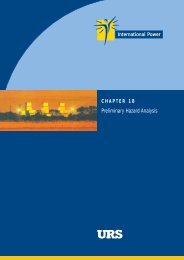Final Report PlanFirst Review Taskforce - Department of Planning
Final Report PlanFirst Review Taskforce - Department of Planning
Final Report PlanFirst Review Taskforce - Department of Planning
Create successful ePaper yourself
Turn your PDF publications into a flip-book with our unique Google optimized e-Paper software.
targeted by DIPNR as high priority areas for regional planning initiatives to commence in the<br />
immediate future.<br />
When establishing these priority areas, DIPNR should have regard to the available resources in the<br />
region (including local government and State agency resources) and existing work programs such<br />
as the Comprehensive Coastal Assessment. It is critical that the targeted high priority areas have<br />
the capacity (adequate staff resources and funding) to deliver regional strategies in an appropriate<br />
timeframe.<br />
In particular, the <strong>Taskforce</strong> considers that the most significant planning issue at this time is the<br />
need to develop a new Metropolitan Strategy. The preparation <strong>of</strong> such a Strategy is considered to<br />
be <strong>of</strong> critical importance for guiding the future development <strong>of</strong> the metropolitan region and for<br />
ensuring that the objectives <strong>of</strong> State agencies are delivered in a coordinated manner.<br />
Regional Forums<br />
Under <strong>PlanFirst</strong>, regional forums were intended to bring together key government and community<br />
interests in a region and advise the Minister on the preparation <strong>of</strong> the regional strategy. Generally,<br />
each regional forum was proposed to consist <strong>of</strong> an independent chair, five community<br />
representatives, five representatives from State agencies in the region and five representatives<br />
from local government in the region. The Minister could also appoint up to four additional members<br />
to represent particular interests <strong>of</strong> that region. Regional forums were to have no statutory power<br />
and were not recognised under the EP&A Act.<br />
The creation <strong>of</strong> regional forums was generally not considered by stakeholders to be the most<br />
appropriate model to assist in the delivery <strong>of</strong> a regional strategy. DIPNR has been criticised by<br />
some stakeholders (particularly local government) for the non-representative nature <strong>of</strong> the forums<br />
and for setting the unachievable goal <strong>of</strong> obtaining consensus from forum members on the final<br />
content <strong>of</strong> regional strategies. In addition, the validity <strong>of</strong> some the proposed regional boundaries<br />
(which directly affected membership <strong>of</strong> the forums throughout NSW) was questionable.<br />
The <strong>Taskforce</strong> has therefore concluded that the regional forums as proposed under <strong>PlanFirst</strong><br />
should be abandoned in their current form.<br />
DIPNR should instead pursue a more targeted approach to meet the different needs <strong>of</strong><br />
metropolitan, coastal and inland NSW. In this regard, it is the experience <strong>of</strong> <strong>Taskforce</strong> members<br />
that in the best regional planning initiatives, the State and local stakeholders have worked together<br />
to facilitate regional outcomes.<br />
DIPNR must employ appropriate methods <strong>of</strong> consultation and involvement (including, where<br />
necessary, the establishment <strong>of</strong> Section 22 Committees) based on the particular regional planning<br />
activity that is being undertaken and the priority for completion <strong>of</strong> that activity. The specific method<br />
<strong>of</strong> consultation, including whether a committee or working group or other planning team is formed,<br />
will vary according to the issue being addressed. In some instances it will be appropriate for<br />
DIPNR to form a small core team to work with limited stakeholders to pursue a regional planning<br />
outcome. In other circumstances it will be appropriate to form a larger and more representative<br />
committee and to consult widely on a particular regional planning initiative.<br />
Whilst the <strong>Taskforce</strong> considers that the regional forums should not be pursued, it is acknowledged<br />
that the current work occurring on various regional planning initiatives will provide the basis for<br />
continuing regional planning in those regions. Hence, the work currently being undertaken by some<br />
Regional Organisations <strong>of</strong> Councils and other stakeholders should be encouraged to continue.<br />
PRINT VERSION<br />
1 September 2003<br />
14


